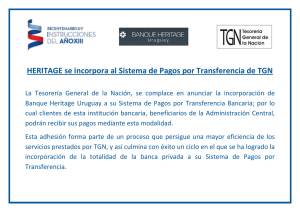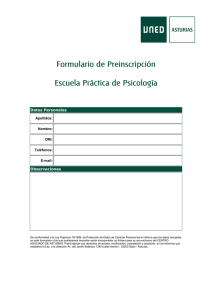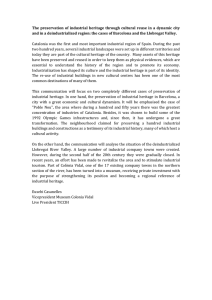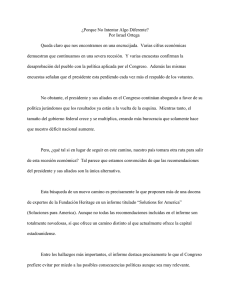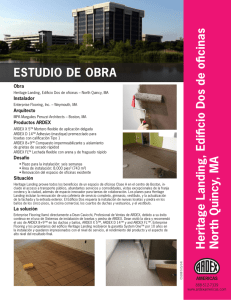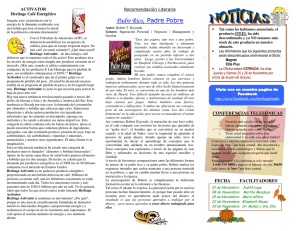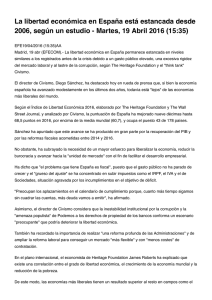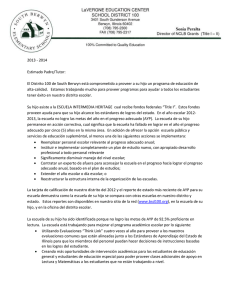XVII International Conference on Industrial Heritage INCUNA 2015
Anuncio
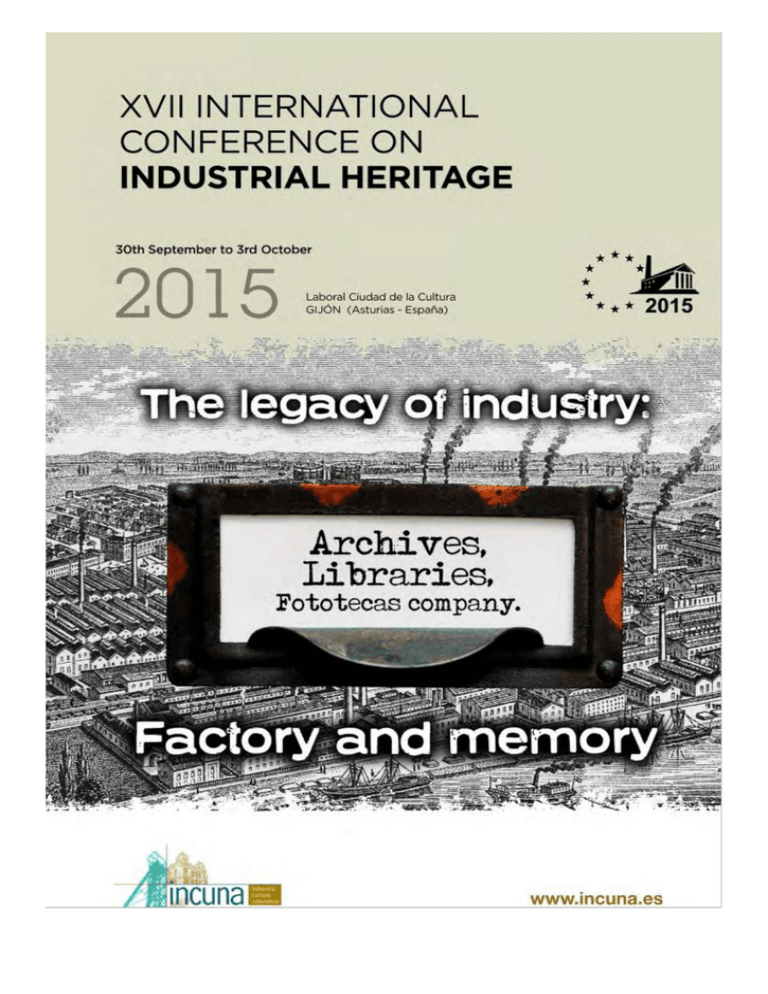
XVII INTERNATIONAL CONFERENCE ON INDUSTRIAL HERITAGE “The legacy of the industry: archives, libraries, photolibraries of company, reuse of historical industrial buildings for documentary centers” Location: Gijón (Asturias, Spain), from September 30 to October 3, 2015 Opening: Wednesday 30 September at 18:00 h. el Salón de Actos del Centro de Cultura Antiguo Instituto. Gijón. Congress venue: Paraninfo Laboral Ciudad de la Cultura. Organize: INCUNA Asociación de Arqueología Industrial "Máximo Fuertes Acevedo". Sponsor and collaborate: Divertia Gijón (Área de Turismo), Gijón Convention Bureau, Colegio Oficial de Ingenieros Superiores Industriales de Asturias y León, Instituto del Patrimonio Histórico Español (IPHE), Consejería de Educación y Cultura del Principado de Asturias, Colegio Oficial de Arquitectos de Asturias, Laboral Ciudad de la Cultura, Sociedad Pública de Gestión y Promoción Turística y Cultural del Principado de Asturias, Fundación EDP, Renfe, Alsa, Impulso Industrial Alternativo, Ayuntamiento de Mieres, Ayuntamiento de Castrillón, y otras entidades e instituciones. Technical Secretariat: Carmen Alonso Suárez. Eva Gutiérrez Sama. Organizing committee: Miguel Ángel Álvarez Areces (Presidente de INCUNA Industria, Cultura, Naturaleza y de TICCIH-España), Eduardo Núñez Fernandez (Archivo Municipal Gijón), Ángel Martín Rodríguez (Escuela Politécnica de Ingenieros Industriales de Gijón, Universidad de Oviedo), Antonio Lista Martín (INCUNA, UIC), Carlos Fernández Caicoya (Profesor de Proyectos en IES Fernández Vallín), Ignacio Valdés Álvarez (INCUNA), José Luis Ruiz Diego (ARPICINCUNA). Scientific and Technical Advisory Committee: Patrick Martin (Universidad de Michigan, USA. Presidente de TICCIH), Miguel Ángel Álvarez Areces (INCUNA y TICCIH-España), Eduardo Núñez Fernandez (Archivo Municipal Gijón), André Munhoz Argollo (Universidad Estadual de Campinas, Brasil. Red Conpadre), Massimo Preite (Università de Firenze, Italia, TICCIH), Julian Sobrino Simal (Universidad de Sevilla), María Linarejos Cruz (Instituto Patrimonio Cultural de España. Ministerio de Cultura), Gladys Collazo Usallán (Presidenta del Consejo Nacional Patrimonio Cultural de Cuba), Begoña Bernal Santaolalla (Presidenta de ICOMOS-España), Victor Fernández Salinas (Universidad de Sevilla e ICOMOS España), Juan Jose Castillo 2 (Universidad Complutense de Madrid), Pilar Biel (Universidad de Zaragoza), Asunción Feliú Torras (Presidenta de E-FAITH, Vicepresidenta Amctaic), Angel Martín Rodriguez (EPII Gijón Universidad de Oviedo), Natalia Tielve García (Universidad de Oviedo), Belem Oviedo Gámez (Archivo minero de Pachuca. TICCIH-México) Joaquín Sabaté (Universidad Politécnica de Cataluña. Red Conpadre); Inmaculada Aguilar Civera (Catedrática Historia del Arte de la Universidad de Valencia), Eusebi Casanelles Rahola (Asesor Museo Colonia Vidal y Honor President TICCIH), Alejandro Acosta Collazo (Universidad Autónoma de Aguascalientes, México), Patrick Viaene (University of Antwerp (Dep. of Heritage Conservation) and University College Ghent (Dep. School of Arts), Bélgica; Board TICCIH), Axel Föhl (State for the Preservation of Historic Monuments of the Rhineland. LVR Rheinisches Amt für Denkmalpflege. TICCIH-Alemania), Lina Constanza Beltrán (Pontificia Universidad Javierana de Bogotá-Colombia), José Manuel Lopes Cordeiro (Universidad do Minho, Braga-Portugal TICCIH), Jorge Tartarini (Museo de las Aguas Argentinas, Buenos Aires), Maria Teresa Pontois (CNRS París), Humberto Morales Moreno (Benemérita Universidad de Puebla, México), Graciela M. Viñuales (TICCIH-Argentina), Giovanni Luigi Fontana (Universidad de Padua, Italia), Miles Oglethorpe (RNMS, Escocia, Reino Unido, TICCIH), Mercedes López García (ETSICCPUniversidad Politécnica de Madrid), José María Sierra Alvarez (Catedrático Geografía Universidad de Cantabria), José Ramón Alonso Pereira (Catedrático Historia de la Arquitectura de la Universidad de La Coruña), Cristina Meneguello (Universidad de Campinas Brasil, Board TICCIH), José Rilla (CLAEH, Universidad de la República Uruguay), Jaime Migone (TICCIH-Chile), Giovanni Luigi Fontana (Universidad de Padova), Alberto Humanes Bustamante (Arquitecto TICCIH-España), Joaquín Ibáñez Montoya (ETSAM Universidad Politécnica. Madrid), Adriaan Linters (Secretary E-FAITH), Wolfgang Ebert (Consultant and Developer ERIH), Franziska Bollerey (Instituto de Historia del Arte, Arquitectura y Urbanismo Ihaau-Technische Universität Delft), Mónica Ferrari (Universidad Tucumán-Argentina, Presidenta TICCIH-Argentina), Benjamin Fragner (Director of the Research Centre of Industrial Heritage VCPD Prague), Ana Cardoso de Matos (CIDEHUS-UÈ, Portugal), Györgyi Németh (University of Miskolc, Hungary), Piotr Gerber (Technical University of Wroclaw Polland). 3 The XVII International Conference on Industrial Heritage, INCUNA 2015, whose theme is the legacy of industry: Archives, Libraries, Fototecas company and reuse experience of heritage in documentation centers. From 30th September to 3rd October in Gijón (Asturias), we propose an agenda about the preservation of documentary heritage as an essential part of working memory and of the place. Archives of the company, libraries and documentary heritage of industrialization are the subject of study and debate. Old companies and social organizations, with strong tradition, that have historical sources of data to be used for local and social use, that compose a part of the value chain, from its strengths as public or private entity. Administrations, universities, foundations, archives, libraries are managers and custodians of many of these documents for a responsible and socially beneficial use. The management of this patrimony, especially the vulnerable such as industrial patrimony is a challenge and an opportunity, with the possibility of the future in multiple aspects: New uses for old structures in unique and historic buildings as documentation centers. Some of the themes of the course of this year 2015 turn around: - - The documentary legacy of commercial entities, industries, social groups and individuals. Projects and Achievements in industrial historical buildings and its current or future use for document services. Resource centers, company archives, libraries, newspaper archives. Photographic libraries, museums of word and oral history, audiovisual heritage. Commercial documents, catalogs, corporate actions. The archigraphy and integration of visual elements with architecture and related aspects. The conception, design, organization, planning and services in documentation centers. Public and private archives, museums and other centers that promote the industrial past Scanning documents, diffusion of documentation centers related to industrial heritage, economic, social or technical history. - Technology archive and industrial processes through new technologies. Documentation and archives of work and workers history, social and economic events that shaped the history since the industrial revolution. Analysis from the point of of view the investigator and of the service provider in the archives, libraries and documentation centers. Heritage, identity, memory, documentaries, photo exhibitions and tours around museums, archives companies, factories, heritage sites. The days INCUNA offering contrasting research, 4 proposals, experiences, with the opportunity to establish projects and further networking and collaboration at international level. Selected papers will be published in volume 17 of “Los ojos de la memoria“ a documentary reference memory of this international event on industrial heritage that each year have a multidisciplinary public: historians, engineers, geographers, architects, economists, cultural managers, artists, designers, tourism managers, technicians and administration officials, managers and technicians of private companies, museum curators and museum professionals, workers and citizens who have an interest to preserve, conserve, enhance and project into the future the industrial past and its material and immaterial testimonies with their work-life scenarios. Contact Technical Secretariat: E-mail: incuna@telecable.es Phone: 00 34 985319385 www.incuna.es 5 Monday, September 28 20:00 h. Opening of the exhibition of the XII International Photography Contest "Factories and Memory" Place: Sala de Exposiciones del Centro Municipal Integrado de El Coto. Plaza de la República, s/n. The Association of Industrial Archaeology "Máximo Fuertes Acevedo" INCUNA, convened and organized the XII International Photography Contest on Industrial Heritage, with the aim of publicizing the remarkable and wide field of archeology and industrial heritage through a universal artistic language, as is the photographic art. The competition have the theme "Factories and Memory", in relation to the theme of the program of the XVII International Conference on Industrial Heritage. The objective is to spread, value and project the images of industrial heritage related to the legacy industry, working memory and place, as well as immaterial and intangible heritage from a multidisciplinary perspective. The exhibition selected by the jury and a large sample of those presented at XII International Photography Contest pictures are displayed. The Photography Contest with the collaboration of "El Corte Inglés" which gives selected by the Jury prize and a mention photography. From Monday 28 September to 9 October. Opening hours at the exhibition: Monday to Friday from 9: 00-22: 00 h. 6 Wednesday, September 30 11:30 h. Reception and Guided tour itinerary and heritage landmarks in the landscape of the region of Gijon. Meeting point for congress members in Town Hall Square. 18:00 h. Inauguration of XVII International Conference on Industrial Heritage. Place: Assembly hall. Centro de Cultura Antiguo Instituto. C/Jovellanos, 21. Gijón Inauguration of the XVII International Conference on Industrial Heritage. Intervention of local, regional and national (Ayuntamiento de Gijón; Principado de Asturias, Ministerio de Cultura de España e IPCE, TICCIH). 18:30 h. Inaugural Conference. Maryan Álvarez-Builla Gómez Dr. Architect from the Polytechnic University of Madrid. The project to transform an old prison in an archive. 19:30 h. Screening of a documentary (25’). Direction: Estudio Noncommon (creative team dedicated to editing and architecture since 2004, Iria Sobrino and Rai Iglesias), in collaboration with Xoán Carmona Badía. Documentary about a archive, mostly unpublished, of 800 lithographic stones found in the centenary company La Artística in 2006, reflecting a century of metalgrafía of spelling on the tin canning industry in Galicia and others-and the rest of Spain. 7 Thursday, October 1 Congress venue: Auditorium. Laboral Ciudad de la Cultura. 8:30 a 9:00 h. Credentialing and documentation to attendees in the auditorium of Laboral Ciudad de la Cultura. Morning sessions: 9:15 to 14:00 h. SECTION 1. BACK TO THE SOURCE: The role of Industry. 9:00 h. PRESENTATION Francesco Antoniol Graduated in Philosophy, University of Padua. Virginia Studio Associato, AIPAI Trentino-Alto Adige (Italy). The management, conservation and enhancement of company archives; the case of Trentino in the italian horizon. 9:45 h. Interventions/Debate. María Concepción Paredes Naves Director of the Historical Archive of Asturias. Consejería de Educación, Cultura y Deporte del Principado de Asturias. The business documentary heritage in the Historical Archive of Asturias. Arnaud Péters Dr. in History. Project Manager. Centre for History of Science and Techniques. Department for the Study of industrial sites. University of Liege. The zinc industry's history and particularly the Vieille-Montagne. Eduardo Núñez Fernández Municipal Archivist. Head of Archives and Documentation. Gijón City Council. Company files Asturias and Spain. 11:00 h. Debate/ Colloquium. 11:30 h. Coffee Break. 8 SECTION 2. INDUSTRIAL BUILDINGS FOR CENTERS DOCUMENTATION. A second life. 12:00 h. PRESENTATION. Paul Smith Department of the steering research and science policy. Heritages Branch. Ministry of Culture and Communication France. TICCIH France. La reconversión de bâtiments industriels en France, d´usines en centres de documentation. 12:45 h. Interventions/Debate. Amaia Apráiz Sahagún, Ainara Martínez Matía and Beatriz Herreras Moratinos PhD in Art History. PhD in Art History. Asociación Vasca de Patrimonio Industrial y Obra Pública IOHLEE-AVPIOP The census of industrial and business files of Euskadi. Márcia Pazin Dr. and Master in History. Universidade Estadual Paulista "Julio de Mesquita Filho" UNESP.Brasil. Comparative analysis of the preservation conditions of historical collection of electricity in the State of São Paulo in different institutional experiences. Patrick Viaene Historian. University of Antwerp (Dep. of Heritage Conservation) and University College Ghent (Dep. School of Arts). TICCIH Board member. Re-using old industrial buildings as archives, libraries and documentation centres in Flanders and the Brussels region. 13:45 h. Colloquium. 14:15 h. Lunch. 9 Afternoon sessions: 16:00 to 19:30 h. Auditorium Laboral Ciudad de la Cultura. Paper Presentation The exposure of different selected works by the Scientific Committee have local, national and international casuistry. Papers are presented in different thematic sections, coordinated by a moderator. The presentation will be made by the authors, organized about thematic content. The estimated time will be about 12-15 minutes approximately. It is recommended to create a presentation PPS of a maximum of 10 slides. Section 1. Papers: Adriana Ortea Arquitecta, Directora Archivo Liebig Entrerríos (Argentina). Memorias obreras de La Liebig. Patrimonio Alimentario del Trabajo de la Carne. Ainara Martínez Matía, Amaia Apraiz Sahagún y María Romano Vallejo Doctora en Historia del Arte. Doctora en Historia del Arte. Licenciada en Historia por la Universidad de Deusto. Asociación Vasca de Patrimonio Industrial y Obra Pública IOHLEEAVPIOP. Identificación y registro de la colección de material gráfico de temática industrial. Alcilia Afonso de Alburquerque e Melo Professora do Curso de Arquitetura e Urbanismo. UAEC. CTRN.UFCG. Liverpool do Brasil. Resquícios do Patrimônio industrial em Campina Grande. Proposta para novo uso de antiga estrutura industrial. Alejandra Brito Peña Historiadora. Dra. en Estudios Americanos, mención Historia. Docente e Investigadora. Dpto. de Cs. Históricas y Sociales. Universidad de Concepción. Chile. Publicaciones industriales en Chile: Instrumentos de difusión y control social. Alejandra Mª Oliván Regalado Catedrática de la Facultad de Ingeniería de la Benemérita Universidad Autónoma de Puebla (México). La evolución de la Fábrica de Talavera: Uriarte. Fuentes documentales e imaginarios como fundamentos para su inclusión como patrimonio industrial poblano. Alejandro Acosta Collazo Doctor en Arquitectura. Profesor investigador de la Universidad Autónoma de Aguascalientes (México). Departamento de Diseño del Hábitat. Don Julio Díaz Torre legacy in the industrial heritage of Aguascalientes, Mexico, 1930-1948. Historical records of an Asturian entrepreneur and grinding technology of San Marcos mill. 10 Alejandro M. Sanz Guillén Estudiante de Grado en Historia del Arte. Universidad de Zaragoza. El archivo de la Compañía Minera en Aragón. Aleksandar Vuckovic Estudiante de Doctorado. Conservación de los Monumentos Arquitectónicos, Departamento de Arquitectura y Urbanismo. Politécnico de Milano (Italia). Foundation Dalmine and the digitalisation of heritage. Ana Luisa Howard de Castilho Arquiteta e urbanista, Mestre e doutora pela Faculdade de Arquitetura da Universidade de São Paulo (Brasil). Acervo da Usina hidrelétrica de Itatinga- Bertioga- São Paulo- Brasil Andrés Hugo Leiría Arquitecto. Docente. Facultad de Arquitectura y Urbanismo, Universidad Nacional de La Plata (Argentina). A historic file in station railway. Planimetric photo documentation as a source of historical research. La Plata (Argentina). Andrés Rodríguez Monteavaro Doctorando en Historia y análisis sociocultural Universidad de Oviedo. Fuentes Orales y Articulación social. El caso de la mina de Pênouta (Bual, Asturias). Ángel Argüelles Crespo Licenciado en Historia, Postgrado en Archivística, Biblioteconomía y Documentación por la Universidad de Oviedo. Técnico de archivos en el Archivo Histórico de Asturias. La recuperación del Archivo Histórico de la Empresa Nacional Siderúrgica S.A. (ENSIDESA) Ángel Martín Rodríguez y Juan José del Coz Díaz Doctor Ingeniero Industrial. Profesor Área Ingeniería de la Construcción. Escuela Politécnica de Ingeniería de Gijón. Universidad de Oviedo. El legado de la industria en la transmisión de conocimientos. Interpretación del Grupo Motor de Laminación del Campus Universitario de Gijón. Ángeles Layuno Rosas, Julia Cristina Pereira, Miguel Ángel Chaves, Pilar Biel y Cristina Rodicio Profesora Titular. Escuela de Arquitectura. Universidad de Alcalá. Arquitecta. Doctoranda de la Universidad de Alcalá. Profesor Titular de Comunicación Audiovisual, Universidad Complutense de Madrid. Profesora Titular. Facultad de Filosofía y Letras. Universidad de Zaragoza. Licenciada en Historia del Arte. Universidad de Valladolid. Arquitectura e Imagen de marca de la industria del Corredor del Henares en los fondos de los archivos públicos y de empresa: el caso de Alcalá de Henares. 11 Miguel Enrique Navarro Rossell, José de Jesús Gómez Serrano y Alejandro Acosta Collazo Maestro en Restauración de Sitios y Monumentos, Universidad Autónoma de Aguascalientes (México). Doctor en Historia de México. Universidad Autónoma de Aguascalientes. Departamento de Historia. Doctor en Arquitectura. Universidad Autónoma de Aguascalientes. Centro de Ciencias del Diseño y de la Construcción. El Patrimonio Documental Ferroviario como instrumento para la obtención de información en el esclarecimiento de las reconfiguraciones del espacio e infraestructura del sistema de haciendas agrícolas en el Bajío Guanajuatense (1876-1910) Centro Nacional Preservación Patrimonio Cultural Ferrocarrilero México. Antonio S. Río Vázquez y Silvia Blanco Agüeira Arquitecto por la E.T.S.A. de A Coruña, Master en Urbanismo y doctor por la Universidade da Coruña. Profesor del Departamento de Composición, Universidade da Coruña. Doctora en Arquitectura por la Universidade da Coruña. Profesora de Historia y Teoría de la Arquitectura en el Centro Superior de Estudios de Galicia. Fotografía y Arquitectura Moderna en España 1925-1965. La fotografía de la arquitectura industrial. Assumpció Feliu Torras Licenciada en Geografía e Historia (especialidad Historia del Arte) por la Universidad de Barcelona. Doctora en Historia del Arte y Civilizaciones por la Université de Rennes 2. Vicepresidenta de AMCTAIC y Presidenta de E-Faith. Archivo de la Empresa Torras Herreria y Construcciones S.A. Carlos Clemente Universidad de Alcalá de Henares. Los Archivos de las empresas en los Archivos de Alcalá: el Archivo General de la Administración del Estado y el Universitario. María Silvestre Madrid, Emiliano Almansa Rodríguez y Jesús Fernández Martinez Escuela de Ingeniería Minera e Industrial de Almadén. Arquitecto especialista en urbanismo por la Universidad de Sevilla. Estudio de Arquitectura Alarife. Archivo Histórico de las Minas de Almadén en su nueva etapa (2000-2015). Carmen María Sánchez Arines Licenciada en Historia del Arte por la Universidad de Santiago de Santiago de Compostela. Socia fundadora de la empresa Etnoga dedicada a la gestión del patrimonio cultural. La Fundación Pazó de Pontevedra y el proceso de recuperación de su catálogo. Célia Gonzálvez Tavares y Mª Dolores Palazón Botella Técnica Superior en Historia, Cultura, Patrimonio y Educación. Fundaçâo Robinson-Portalegre (Portugal). Doctora europea en Historia del Arte. Profesora asociada de la Universidad de Murcia. The documents of the Robinson Factory: The documentary heritage of a cork industry. 12 Alejandro Bocanegra Cayero Estudiante de Arquitectura PFC, Universidad de Valladolid. Fundador y Presidente del Proyecto Silos. Silos, motores de desarrollo local. (Poster). 13 Section 2. Papers: Conxa Bayó Soler Ingeniera textil, ex conservadora Museo de la Ciencia y Técnica de Cataluña. Importancia de la Iconografía en los Archivos Industriales. Covadonga Ríos Díaz Dr. Arquitecto. Universidad Nebrija. AEPPAS20 Asociación Española para la Protección del Patrimonio Arquitectónico del Siglo 20. Edificios y áreas industriales como espacios de oportunidad para una segunda vida. Daniel Pérez Zapico Doctorando en Historia. Universidad de Oviedo / CHCSC Université de Versailles SaintQuentin-en-Yvelines. The electrification of Asturias, a forgotten chapter in the industrial history of the Principality (1880-1936). Documentary sources for study and research results. Demetrio Fuentes Ferrera, Emiliano Almansa, Antonio Trenado y Jesús Fernández Martínez Escuela de Ingeniería Minera e Industrial de Almadén. Universidad de Castilla La Mancha. Arquitecto especialista en urbanismo por la Universidad de Sevilla. Estudio de Arquitectura Alarife. Recuperación patrimonial del último molino harinero de Almadén (Ciudad Real). Enrique Esteban Gómez Cavazos Licenciatura en Arquitectura. Facultad de Arquitectura Universidad Autónoma de Nuevo León UANL. Master en Urbanismo y estudiante de doctorado. Departamento de Urbanismo y Ordenación del Territorio de la Universitat Politécnica de Catalunya. Buscando la ruta peninsular de company towns: Trazados originales y patrimonio industrial en la Baja California. Esther Núñez Pariente de León Área de Investigación. Centro de Intervención. Instituto Andaluz del Patrimonio Histórico (IAPH). Notas acerca del horno-tejar de época Pickman integrado en la sede del IAPH. Evandro Duarte de Sá y Alcilia Afonso de Albuquerque Melo UAEC. CTRN.UFCG (Brasil). O legado cultural do industrial Delmiro Gouveia no nordeste brasileiro. Preservação de sua Obra e da Memória empreendedora como Fator de Desenvolvimento Cultural e de Fomento ao Turismo Industrial regional. 14 Francisca Ferreira Michelon, Diego Lemos y Josanna Peil Coelho Docentes do Programa de Pós-Graduação em Memória Social e Patrimônio Cultural da Universidade Federal de Pelotas. Mestranda no Programa de Pós-Graduação em Memória Social e Patrimônio Cultural da Universidade Federal de Pelotas. Recycling the former wool factory Laneira Brasileira S.A./Pelotas – RS: memory of work and cultural scenery. Gerardo J. Cueto Alonso Grupo de Investigación en Geografía Histórica del Paisaje. Departamento de Geografía, Urbanismo y Ordenación del Territorio. Universidad de Cantabria. La sección de deportes en las revistas de empresa. El ejemplo de Cantabria. Guilherme Pinheiro Pozzer Licenciado, bacharel e mestre em História pela Universidade Estadual de Campinas (UnicampSP, Brasil), especialização na área de “Política, Memória e Cidade”. Doutoramento na Universidade do Minho (Portugal). The documentation of the factory Sampaio Ferreira & Cia in the Administration of the Northern Hydrographic Region (ARH-NORTE) Helena Navarro Gatti Gimenes y Giulia Vercelli Arquitectas y Urbanistas. Universidad Estatal de Campinas Brasil y Politecnico Torino (Italia). A new tone for the "Company Sâo Pedro". Redevelopment of the ancient complex "Companhia Fiaçâo e Tecelagem Sâo Pedro”. Humberto Morales Moreno y Óscar Alejo García Historiador, Resp. Posgrado en Ciencias Sociales. Benemérita Universidad Autónoma de Puebla (BUAP - México). Asesor de la Secretaría General de Gobierno del Estado de Puebla. Reutilización de la antigua fábrica textil La Constancia Mexicana: Museos, Escuelas y Centros de Documentación. Iñaki Uriarte Palacios Arquitecto Otras miradas a la cultura de la industrialización. Arquigrafía, Iconografía y simbología. La industria y el trabajo en las Bellas Artes. Ísis Meireles Rodrigues y Marina Lages Gonçalves Teixeira Professora da Pós Graduação em Arquitetura e Urbanismo. DCCA. CT. UFPI. Pesquisadora do Grupo de Pesquisas Arquitetura e Lugar. UFCG. Patrimônio Industrial Piauiense: Entre o apogeu econômico e o abandono. Jessica de Fátima Rossone Alves y Fabiana Mendes Tavares Jacques Academic of Architecture and Urban Planning at Federal University of Juiz de Fora. Graduated in Architecture and Urban Planning by the Universidade Federal o Río de Janeiro. 15 Proposal for Rehabilitation of Ipiabas Railway Station. Barra do Pirai Railway Memory / RJ – Brazil Jesús Fernández Martínez, Emiliano Almansa Rodríguez y María Silvestre Madrid Arquitecto especialista en urbanismo por la Universidad de Sevilla. Estudio de Arquitectura Alarife. Profesor Titular de la Escuela de Ingeniería Minera e Industrial de Almadén (UCLM) y Dr. por la Universidad de Córdoba. Profesora de la Escuela de Ingeniería Minera e Industrial de Almadén. Intervención arquitectónica en la plaza de toros de Almadén perteneciente al conjunto minero, declarado por la Unesco como sitio patrimonio de la Humanidad. José Antonio Reyero Profesor del Máster en gestión de empresas Marítimo Portuarias y Derecho marítimo, en la Universidad de Deusto. Msc. MCQI CQP. Ha sido Inspector Principal y jefe metalúrgico para España del Lloyd´s Register of Shiping y Director Gerente para España, Portugal y Cuba del Lloyd´s Register Quality Assurance. The dangers of "sedentarisme" in historical research. (Advantages and disadvantages of use and abuse of the Internet). José Miguel Remolina Seivane Arquitecto. Colegio Oficial de Arquitectos de Cantabria. La construcción de la fábrica Nestlé de La Penilla (Cantabria). Estudio de la evolución del complejo a través de la documentación gráfica. Juan Francisco Salamanca y Luz del Carmen Jimarez Caro Doctores en Arquitectura, Profesores-Investigadores de la Benemérita Universidad Autónoma de Puebla (BUAP). México. La arquigrafía y elementos visuales históricos en el ex Molino de Huexotitla (Puebla, México) Luis Miguel Piñera Entrialgo Ingeniero Técnico Industrial, historiador y escritor. Gijón (Asturias). Obreros y fábricas en la colección fotográfica de Constantino Suárez. 16 21:30 h. Ludic-thematic activity of the program of the XVII International Conference of Industrial Heritage INCUNA 2015 NoSitio is a project about reclamation spaces through the arts, heritage and collective memory. In this context we propose a cultural evening in which a dinner with evaluation of the Asturian gastronomic heritage, a musical concert and a video installation that takes place in the Citadel of Capua (historical set of workers' housing) to be held 21:30 h. Optional activity. Cost not included in the registration fee of the XVII Conference. Price: 24 €. Reservation to the Technical Secretariat requested in incuna@telecable.es or phone 985 31 93 85. 17 Friday, October 2 Congress venue: Auditorium. Laboral Ciudad de la Cultura. Morning sessions: 9:00 to 14:00 h. SECTION 3. CONSERVATION AND RELEASE: DOCUMENTATION CENTERS OF INDUSTRIAL HERITAGE: New technologies for the treatment of documentary heritage. 9:00 h. PRESENTATION. Josep Fernández Trabal Doctor of Medieval History. Arxiu Nacional de Catalunya. Protection and diffusion of industrial files from the experience of the National Archiu de Catalunya. 9:45 h. Interventions/Debate. Miguel Ángel Gacho Santamaría Doctor in History. Master in Archive. President ANABAD (Federación Española de Asociaciones de Archiveros, Bibliotecarios, Arqueólogos, Museólogos y Documentalistas). The Royal Family and the Royal Factories. Documentary sources. Linarejos Cruz and Daniel Durán Coordinator of the National Industrial Heritage Plan, IPCE. Ministerio de Cultura. Conservative Scientific. Institute of Cultural Heritage of Spain (IPCE). Ministerio de Cultura. Industry, art and document. The legacy of J. Laurent. José Manuel Lopes Cordeiro and Francisco Silva Costa Institute of Social Sciences, University of Minho, Interdisciplinary Center of Social Sciences. Pole UM CICS.NOVA.UMinho, APPI / TICCIH Portugal. Institute of Social Sciences of the University of Minho, Study CEGOT Central in Geography and Regional Planning. Another view of industrial files: the APA acquis and the ARCHIV-AVE Project. 18 10:30 h. Interventions/Debate. 11:00 h. Presentation of the book “Industrial neglected place. Heritage and environment management”, volume 16 Los ojos de la memoria. Presentation of the book "Living and working industrial city in the twentieth century." Editing TICCIH- Spain. Intervention about 2015 European Industrial and Technical Heritage Year. 11:30 h. Coffee Break. 19 SECTION 4. DOCUMENTARY SOURCES OF INDUSTRIAL PATRIMONY AT SERVICE OF THE INVESTIGATIONS: The documentary heritage as raw material. 12:00 h. PRESENTATION Susana Landrove Bossut Director of the Iberian DOCOMOMO Foundation. Documentary archives of architecture of the Modern Movement. 12:40 h. Interventions/Debate. Xoán Carmona Badía y Mariña López Rodríguez Professor of Economic History at the University of Santiago de Compostela. ANFACO-CECOPESCA Museum. Documentary Heritage and business organizations: the Museum ANFACO of the canning industry. María Teresa Ventura Rodríguez, José Eduardo Carranza Luna and Dionisio Domínguez Teachers-Researchers at the Benemérita Universidad Autónoma de Puebla BUAP (México). Archive of industrial culture and Historical Photo Library of Workers Encounters. Jaume Perarnau i Llorens Director of the Museo de la Ciencia y la Técnica de Cataluña. Industrial Intangible Heritage of Catalonia. A program of documentation innovation of mNACTEC. 13:20 h. Interventions/Debate. 13:45 h. Colloquium. 14:15 h. Lunch. 20 Afternoon sessions: 16:00 to 19:30 h. Auditorium Laboral Ciudad de la Cultura. Paper Presentation Section 3. Papers: Josu Aramberri Licenciado en Ciencias Físicas y Doctor en Informática. Profesor Universidad del País Vasco. Photo archives: use and dissemination in a digital world. Juan Manuel Pérez López Director del Archivo Histórico Minero de Río Tinto. Fundación Río Tinto. El caso del Archivo Minero de Río Tinto y la red de archivos de empresa en Andalucía. Manuel Rodrigo de la O Cabrera y David Escudero Boyero Arquitectos por la Escuela Técnica Superior de Arquitectura de la Universidad Politécnica de Madrid. Cultural Landscape Research Group. Landscapes of Energy: a filmic measurement (1940-1975) María Centeno e Ilse Mª Crocamo de Rodríguez Profesoras. Universidad de Panamá. Los archivos de las empresas en el Archivo Universitario de Panamá. María Isabel López Meza Arquitecto por la Universidad de Chile. Doctora en Desarrollo Urbano por la Universidad Politécnica de Madrid, Profesora en programas de Diplomado, Magíster y Doctorado. Universidad del Bio Bio. Chile. Mining Museum in Schwaguer, Chile; an opportunity to recover the mining landscape. María Julia Burgueño Angelone Historiadora. Profesora de Historia. Investigadora en patrimonio cultural e industrial y turismo. Coordinadora de gestión patrimonial en Paysandú (Uruguay). The necessary enhacement of the bajo Rio Uruguay's industrial heritage archives. Mª Luisa García García-Saavedra y Mª del Mar Escalante Fernández Arqueólogas. Las fuentes históricas en la investigación de molinos harineros de Navalagamella (Madrid). María Tejada y Ludwin Martínez Jefa del Departamento del Archivo Central Institucional del Tribunal electoral de Panamá. Funcionario del Departamento de Digitalización del Tribunal Electoral de Panamá. La digitalización en la conservación y difusión del patrimonio documental. 21 Marina Lages Gonçalves Teixeira y Alcilia Afonso de Alburquerque Melo Pesquisadora do Grupo de Pesquisas Arquitetura e Lugar. UFCG. Professora do Curso de Arquitetura e Urbanismo. UAEC. CTRN.UFCG – Brasil. Usina Santa Teresina Piauí: novos usos para o patrimonio industrial no dordeste brasileiro. Marta Vera Prieto Doctora en Bellas Artes por la Universidad de Castilla-La Mancha. Fundación Juanelo Turriano/Asociación de Amigos de las Reales Fábricas de Riópar. Fuentes documentales de la industria: en la fábrica y al servicio de ciudadanos e investigadores. El Centro de Documentación de las Fábricas de San Juan de Alcaraz y Cartagena (en Riópar, Castilla-La Mancha). Martí Boneta i Carrera y Xavier Tarraubella Mirabet Técnico Docente. Departamento de Educación de la Generalidad de Cataluña. Director del Archivo Histórico de Barcelona. Comisión centenario hidroeléctricas en el Pirineo. Photographic documents for the study of the construction of the hydroelectric industry in the Lleida Pyrenees. Miguel Ángel Alvarez Areces y María Aranzazu Quiroga Alonso Economista, Presidente de INCUNA y de TICCIH España. Documentalista CRP INCUNA Centro de Referencia Documental sobre Patrimonio Industrial. Oliver Cruz Jiménez y Leonardo Quintana Meraz Arquitecto. Gerente de Proyecto en Impulsora de Desarrollo e Infraestructura. Arquitecto. Profesor Universidad Autónoma Metropolitana, Xochimilco (México). La antigua planta de cementos La Tolteca. Pamela Fuentes Pradenas Directora del Museo Histórico de Placilla (Valparaíso-Chile). Master en Historia y Gestión del Patrimonio Cultural por la Universidad de Los Andes (Santiago-Chile). El Sauce: vanguard hydroelectric plant. Importance and legacy for industrial and urban development of the city of Valparaiso Chile. Patricia Herrero Sánchez Historiadora, Gijón (Asturias). El Archivo Fotográfico de la Antigua Universidad Laboral de Gijón. Del caos al orden. Paulo de Melo Noronha Filho Sociólogo. Presidente da Rede de Museus de Juiz de Fora e Zona da Mata e Membro do Conselho Estadual de Museus do Estado de Minas Gerais (Brasil). Memory and work: the production of objects for science, learning, and manufacturing of the device factory of the Juiz de Fora engineering school. 22 Pilar Biel Ibáñez y Blanca Robles Departamento de Historia del Arte, Universidad de Zaragoza, TICCIH España. Fundación Basilio Paraíso, Cámara de Comercio de Zaragoza. La recuperación de los archivos industriales en Aragón. Rosemary Lopes Rodrigues, Josemary Omena de Passos Ferrare y Lúcia Tone Ferreira Hidaka Graduadas em Arquitetura e Urbanismo, Universidade Federal de Alaguas (Brasil). Valores do patrimônio industrial têxtil no nordeste brasileiro: o caso da antiga Companhia Alagoana de Fiação e Tecidos, no estado de Alagoas. Ricardo Martíns y Luis Pereira Responsables del Área de Archivo y Gestión Documental de Illumini Consultoria na Área da Investigação. The outskirts of utopia – the documental assets of the Factory Maceira-Liz. Rafael García García Profesor Titular en el Departamento de Composición Arquitectónica de la Escuela Técnica Superior de Arquitectura de la U.PM. Crossed documentation. The Plan Badajoz factories in the NODO and in the bibliographic references. Angelina Sánchez, Nicolás Pinkus y Gustavo Sergio López Diseñadora Gráfica. Docente. Universidad Nacional de Lanús (Argentina). Director de Investigación. Profesor de Comunicación e Historia del Diseño de la Universidad Nacional de Lanús Co-director de Investigación. Arquitecto. Universidad Nacional de Lanús Modernity and typography on industrial buildings: The case of the city of Buenos Aires (Argentina). (Poster). 23 Section 4. Papers: Ricardo Sánchez Lampreave y Raimundo Bambó Naya Escuela de Ingeniería y Arquitectura. Departamento de Arquitectura. Universidad de Zaragoza. La Fábrica Nacional de Moneda y Timbre. Los archivos de su historia. Pedro Fandos Rodríguez Geólogo. Grucomi. La planoteca minera de la Cuenca Carbonífera Central asturiana. Alcilia Afonso de Alburquerque e Melo y Jully Samara Ferreira do Carvalho Professora do Curso de Arquitetura e urbanismo. UAEC. CTRN.UFCG- orientadora. Estudante de graduaçao em Arquitetura e urbanismo- UAEC. CTRN.UFCG- pesquisadora. Brasil. O Ouro Branco no nordeste brasileiro. Resgate das fontes documentais do patrimonio industrial do ciclo do algodao em Campina Grande 1930-1960. Rocío Piqueras Gómez Doctoranda Escuela Técnica Superior de Arquitectura. Universidad Politécnica de Valencia. El Salto del Molinar. Paradigma de modernidad y avances tecnológicos. Amaia Apráiz Sahagún, Ainara Martínez Matía, María Romano Vallejo y María Molinuevo Zaballa Doctora en Historia del Arte. Doctora en Historia del Arte. Licenciada en Historia por la Universidad de Deusto. Licenciada en Historia por la Universidad de Deusto. Asociación Vasca de Patrimonio Industrial y Obra Pública IOHLEE-AVPIOP. Catalogación y valoración patrimonial del fondo documental de Altos Hornos de Vizcaya depositado en Konsoni Lantegia. Luz del Carmen Jiménez Caro y Juan Francisco Salamanca Montes Doctores en Arquitectura, Profesores-Investigadores de la Benemérita Universidad Autónoma de Puebla (BUAP). México. Centro de Documentación e Investigación Ferroviaria y Museo de Sitio Nacional de los Ferrocarriles Mexicanos. Ronaldo André Rodrigues da Silva Doutoramento em História. Universidade do Minho. Comitê Brasileiro para a Preservação do Patrimônio Industrial - TICCIH-Brasil Industry files, the company town and the preservation of social memory: A brazilian case study. Rosabel Pérez Molina Licenciada en Historia del Arte por la Universidad de Granada. Máster Oficial en Arquitectura y Patrimonio Histórico. Doctorando en la Universidad de Sevilla. Protecting the industrial heritage. 24 Rosemary Lopes Rodrigues, Josemary Omena de Passos Ferrare y Lúcia Tone Ferreira Hidaka Universidade Federal de Alaguas (Brasil). Patrimônio industrial em risco: estudo sobre o abandono da antiga Fábrica de Tecidos Norte das Alagoas, no estado de Alagoas/Brasil. Sara del Hoyo Maza Licenciada de grado en Historia del Arte por la Universidad de Oviedo y Máster Universitario en Patrimonio Histórico y Territorial por la Universidad de Cantabria. Doctoranda en Historia del Arte, Universidad de Oviedo. Becaria en formación, Museo Etnográfico de Cantabria. Say to me what you announce and I will say to you who you are: the Sociedad Anónima José María Quijano (Los Corrales de Buelna, decades of 1920 and 1930). Silvia Carbonell Basté Licenciada en Historia del Arte por la Universidad Autónoma de Barcelona, máster en diseño textil por la Escuela Universitaria de Ingeniería Técnica Industrial de Terrassa, posgraduada en museología en la Universidad de Brno. Área Técnica del Centre de Documentació i Museu Tèxtil, Terrassa. La memoria de los telares: recuperación, documentación y difusión del patrimonio industrialtextil. Sinhúe Lucas Landgrave y Silvia Cuevas Sánchez UNAM, CMCPIA.C., Museo Numismático Nacional/Tecnológico de Tlalnepantla, Museo Numismático Nacional (México). Los archivos documentales y fotográficos del Museo Numismático Nacional. La historia escrita en los muros y en los soportes de la memoria. Susana Climent Viguer Doctora en Geografía e Historia por la Universidad de Valencia. Cátedra Demetrio Ribes UVCITMA Business and family: the file of La Maquinista Valenciana. Susana Menéndez Seoane Archivera de la Autoridad Portuaria de Ferrol-San Cibrao (Galicia). Ports archives. Its nature and its funds. Tamar Awad Parada Arquitecta, ETSA Madrid. Diplomada en Estudios Avanzados en la E.T.S.A.M. en el programa de Doctorado de Dibujo, Historia y Construcción (Ideación Gráfica). Arquitectura Industrial tabacalera española. Valeria Megna PhD student. Università degli Studi di Palermo. Dottorato in Architettura Arti e Pianificazione. The Palermo shipyard archive. 25 Vanessa López Arrebola Responsable del Fondo Histórico de Endesa en Cataluña. Graduado en Relaciones Públicas y Comunicaciones en Organizaciones por la Universidad de Barcelona. The historical fund of ENDESA. Its value and management. Virginia García Ortells Técnico para la conservación y gestión del Patrimonio Histórico de FGV. TICCIH-España. Doctoranda en Historia del Arte, con Máster en Conservación y Gestión del Patrimonio Cultural. The dissemination of the historical documentary heritage pertaining to Ferrocarrils de la Generalitat valenciana (Valencian Government Rrailways’ company). Sociocultural profitability of a corporate archive. Yesica Pino Espinosa Arquitecta. Doctoranda en el área de Arquitectura y Proyectos Arquitectónicos. E.T.S. de Arquitectura de Valladolid Looking industrial heritage throught film. 19:30 h. Ending of the XVII International Conference on Industrial Heritage. Closing conference Advancement of cultural and heritage itinerary for Saturday October 3rd. Alfonso García Head of Historic Archives of Asturiana de Zinc (Azsa). The RCAM, capital experience archive for the history of industrialization in Spain. Conclusions and delivery of diplomas. 26 21:00 h. Visit and opening of the Photographic Exhibition former Anglo refrigerator 2015 Place: Colegio Oficial de Arquitectos de Asturias. Sede de Gijón. Calle Recoletas, 4 (next to Plaza Mayor and Plaza del Marqués). Guide: René Boretto Ovalle (former director of the Museum of the Industrial Revolution ANGLO of Fray Bentos (Uruguay) The exhibition of British photographer Ian Kemp captures the essence of the Uruguayan Anglo Refrigerator, one of the major meat factories in South America until the late 1960s and whose industrial landscape Fray Bentos was recently declared a World Heritage Site by UNESCO, including its 275 hectares architecture refrigerator, industrial facilities, docks on the Uruguay River, the slaughterhouse, the pastoral areas, the residences of leaders and workers and places of entertainment. The factory was founded in 1887 with capital English, Irish, Germans and Uruguayans and soon became one of the largest in South America, reaching 25,000 people to work. This exhibition reflects the memory of which was referred to as the "great kitchen of the world" and the invention of Liebig's Extract of Meat Company made famous by Anglo worldwide during World War II, since much of its production meat destined for the manufacture of a meat extract known as corned beef, used to feed the Allied soldiers. In collaboration with the Ministerio de Turismo y Deporte de Uruguay and Colegio Oficial de Arquitectos de Asturias. 27 Saturday, October 3 Itinerary of historical archives and enterprises about the Industrial and Cultural Landscape of Asturias Activity registered within the European Heritage Days, a program promoted by the Council of Europe and the European Union dedicated to the 2015 European Year of Industrial and Technical Heritage. 9:00 h. Departure from the Jardines del Campo Valdés in Gijón (behind the City Hall). Planned arrival at Gijon at 20.30 h. 9:30 h. Guided tour to the Historical Archive of Asturias. C/ Arcipreste de Hita s/n, Oviedo. Center for Information and Research that in 2010 moved to a new location, the former provincial prison of Oviedo, experiencing an extraordinary increase of the documentary in all sections of the file, by having deposits for external documentation based center, and therefore an increase in users. Guided tour to the historic complex of the Real Company Asturiana de Minas. Asturiana de Zinc (AZSA) and its archive. Arnao (Concejo de Castrillón) A historical overview of the company Asturiana de Zinc (AZSA), heir to the Real Company Asturiana de Minas will be from its origins in 1833 to the present, visiting the area manufacturing spaces as the old and new mill, the old store items, the outside area to the bridge, the historical Archive and the main tank documentation. Guided tour to Arnao´s Mine Museum. Arnao mine is one of the most emblematic sets of mining heritage of Spain. Located in a privileged coastal landscape, it is the oldest operating Iberia coal, the oldest vertical well of Asturias and the only underwater mine in Europe. Closed in 1915, the wooden headframe, which has earned the qualification of cultural interest, and its underground galleries, with nearly two hundred years, let relive the atmosphere of a primitive mine. Lunch. Evaluation and tasting culinary heritage with the subsequent study and consideration of intangible heritage and other thematic ludic aspects of the area 28 Visit to the Gauzón´s castle: a fortress of the kings of Asturias (VIII-X centuries) Gauzón Castle, the most emblematic fortress of the kings of Asturias, is located on the Rock Roots (Castrillon). From its location he is dominating the estuary of Avilés and the waterfront. In times past the sea he came to the foot of the promontory. From the VIII-IX centuries, the kings of Asturias transform the settlement, using the most advanced architectural designs of the time. The castle appears organized on different platforms: the highest houses the real space, divided into stepped terraces that descend in height from the south to the north. Each receives certain functions, like the neighborhoods of a city. Tour by a section of the coastal branch of the Camino de Santiago North, declared World Heritage by UNESCO in 2015. 29 Sunday, October 4 Cultural heritage of the council of Mieres: mining Turon Valley, the paternalism embodied in Bustiello Activity registered within the European Heritage Days, a program promoted by the Co uncil of Europe and the European Union dedicated to the 2015 European Year of Industrial and Technical Heritage. In collaboration with Consejería de Educación y Cultura del Principado de Asturias. 9:15 h. Departure by bus from Jardines del Campo Valdés en Gijón (behind the City Hall). 9:45 h. Meeting point in Oviedo, Plaza de América. 10:30 h. Visit to the Bustiello Mining Village Interpretation Centre The celebrated model village of Bustiello is the real "gem" of the Hullera Española mining company world. Bustiello embodies the entrepreneurial and social philosophy of Hullera Española, which, located in a peripheral mining area and narrow valleys, was to monopolize local power and territorial organization. According to this model, the company took great care of the production area and developed a paternalistic social policy via which it took charge of the lives of workers beyond the workplace: housing, utilities, education, health, leisure and culture. Bustiello is an example of all this and its Interpretation Centre constitutes a facility that has breathed new life into the village and its surroundings through the permanent exhibition and the organization of guided visits to the site. A vision of the industrial past that is both different and interesting for those in search of cultural experiences. 12:00 h. Visit to the Turón Valley Mining Landscape For a century, from the late 19th up to the end of the 20th century, the Turón Valley was a reference for Asturian mining. 30 This Turón Valley landscape combines nature and countryside with urban and peri-urban areas, organized around a river constituting its backbone and the vestiges of an old mining railroad, now a greenway. It is in fact an industrial landscape that brings together a remarkable catalogue of heritage landmarks, including some as emblematic as Fortuna Colliery, Espinas Pit, Santa Bárbara Pit, San José Pit, Figaredo Pit, and villages like Figaredo, Reicastro, La Cuadriella, etc. All of them living testimonies of a unique industrial culture. Some of these resources can be visited and a documented route is well worth the walk. For more information, see www.territoriomuseo.com 14:00 h. Evaluation and tasting culinary heritage in local restaurant. Menu must be paid by the participants 16:00 h. Return to Oviedo and Gijón. 31 RULES FOR PAPERS AND POSTERS Papers will be sent to INCUNA, with indication or suggestion in one of the four sections of presentation proposed in this program. Presentation will presented by the author, no reporters. There will be a period for public exhibition, which will be adjusted in the final program. The official languages of the XVII International Conference on Industrial Heritage are Spanish, English, Portuguese and French. Any of them may submit the texts and expose the work. SHIPPING DEADLINES ABSTRACT / ABSTRACT For the acceptance of communications, posters and papers prior sending a summary or abstract, in Spanish (or native language) and English for a maximum of 20 lines, to deliver before July 10th 2015. Once evaluated by the organizers and Scientific Committees will realize admission, both for exhibition and meeting in plenary as for publication. Along with summaries must also submit a recent photo of author and a brief CV of about ten lines. A book of abstracts with photo and CV in different languages will be published. Send to: XVII Jornadas Internacionales Patrimonio Industrial INCUNA, Asociación de Arqueología Industrial Máximo Fuertes Acevedo C/ La Muralla, 3 entlo.- 33202 Gijón Telf. / Fax: 00 34 985319385 www.incuna.es E-mail: incuna@telecable.es SEND FULL TEXTS Should submit a final text, posters and final papers, with comments listed below and must be respected for approval ahead of the publication in books and national and international databases. The delivery of the texts that have been accepted by the Scientific Committee will be held before September 8th, 2015. 32 GUIDELINES FOR PUBLICATION IN THE BOOK OF RECORDS IN THE COLLECTION VOLUME 17 LOS OJOS DE LA MEMORIA - The text should be a maximum of about 17,000 characters with the font Times New Roman, 12 points and line spacing 1.5. Reference bibliography is included. File Format: Texts should be sent in a file format * .doc Word. The graphic material (photographs, illustrations, maps ... ) must have a minimum resolution of 300 dpi (dots per inch) (at least one mega) and will be delivered in JPG or TIFF format about 6 illustrations per article ahead of the release are recommended. POWERPOINT PRESENTATIONS PowerPoint presentations will be sent to a file format * .ppt or * .pps, along with the final text, preferably before September 10th. If the exposure requires the use of special media, please inform us, along with sending your abstract and paper, and in sufficient time to adapt the appropriate technical means. PRESENTATION AND POSTERS EXHIBITION - The poster will be sent formated and designed by the author. The material and shipping is the responsibility of the author, unless previously agreed exception. - The size of the posters will be of size A-1, and include a header with title, authors and contact, followed by an abstract or summary, four photographs, and ending with some conclusions. Must include the logo of the conference. - The poster must be send before September 10th or scanned copy if the author can not send it for mail problems. EXHIBITION OF WORKS AND DIPLOMAS Will send you diplomas of the presentations, papers and posters that are accepted for presentation conference. For the subsequent publication of communications will need to be registered and participated to the Conference. An entire folder with the work and documentation of the congress and other materials on the event will be delivered. 33 REGISTRATION FEES Registration for the XVII Conference allow to attend all presentations and papers, poster presentations and conduct local itineraries, practical complement; receive communications material and other publications in connection with this, as well as the accreditation certificate of attendance. The excursions of Saturday 3 th and Sunday, October 4 th are limited by the number of seats available seats transport. It should be specified at the time of registration if the tour is included or only registration for the conference. Bookings are made by order of registration to it. Registration fees are the follows: A. A.- Conference Complete (including excursion with food): 135 € B. Conference Complete Partner of INCUNA and of TICCIH-Spain (including excursion with food): 115 € C. Partners INCUNA and TICCIH-Spain (no trip): 85 € D. General Registration for the conference (no trip): 105 € E. Students, Unemployed and pensioners (no trip): 90 € F. F.- Students, Unemployed, Retirees (with excursion and lunch): 120 € Please, sent the amount and the name of person who make the registration to: INCUNA Asoc. de Arqueología Industrial Máximo Fuertes Acevedo Bank: CAJASTUR C/C: 2048 0003 69 3400103287 IBAN: ES57 2048 0003 6934 0010 3287 SWIFT Code: CECAESMM048 You can also pay by PayPal Check instructions to the Technical Secretariat. 34 REGISTRATION XVII INTERNATIONAL CONFERENCE ON INDUSTRIAL HERITAGE DATOS PERSONALES Name and surname Address Postal Code Province Telephone Email ID/Passport Location Country Fax Profession TIPO DE INSCRIPCIÓN A.--‐ Conference Complete (including tours with lunch): 135 € B.--‐ Conference Complete Partner of INCUNA and of TICCIH-Spain: (including tours with lunch): 115 € C.--‐ Partners of INCUNA and TICCIH-Spain (no tours): 85 € D.--‐ General Registration for the conference (no tours):105 € E.--‐ Students, Unemployed and pensioners (no tours): 90 € F.--‐ Students, Unemployed, Retirees (with tours and lunch) 120 € Saturday October 3rd tour SI NO Sunday October 4th tour SI NO Will expose paper? Will expose poster? SI SI NO NO Title: COMPANY/ENTITY Name of institution C.I.F. Address Postal Code Province Telephone Email Position City Country Fax Fill out this form and send it along with copy of the payment of the registration fee to: INCUNA, Assoc. Of Industrial Archaeology Máximo Fuertes Acevedo C / La Muralla, 3 entlo. 33202 Gijón (Spain) By email to : incuna@telecable.es and incuna@gmail.com 35
